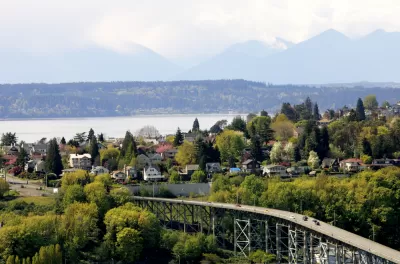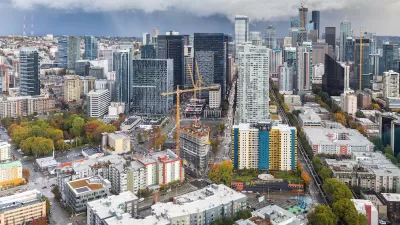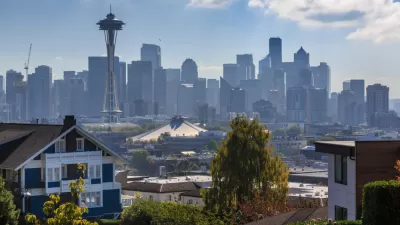Seattle's suburbs are no longer leading the region in housing construction, even as Seattle's urban core is building more housing than ever.

Mike Rosenberg reports on the regional housing market in Seattle, where suburban housing construction has slowed considerably, especially compared to the record-setting pace of building taking place in the more urban, central areas of the region.
The region's suburbs are no longer producing housing at a rate commensurate with the suburban share of the region's population. "Overall, Seattle housing construction has grown 130 percent this decade compared to the average over the prior three decades, while housing development in the suburbs has dropped 43 percent from its historical average," reports Rosenberg. The decline of suburban housing means housing production is declining for the region as a whole—that despite steady development in Seattle producing what some are describing as a glut in the rental market.
"The shift is the result of a combination of developers chasing the biggest profits in Seattle – where housing demand has gone through the roof, and city leaders have opened the floodgates for bigger buildings – and suburbs restricting new construction through zoning laws that all but ban new housing in most parts of the region," according to Rosenberg.
The feature-length coverage of the regional landscape for housing development includes a lot of data visualizations and additional means of putting the suburban housing slow down in perspective.
FULL STORY: Housing construction in local suburbs is at historic lows, while Seattle is setting records

Alabama: Trump Terminates Settlements for Black Communities Harmed By Raw Sewage
Trump deemed the landmark civil rights agreement “illegal DEI and environmental justice policy.”

Study: Maui’s Plan to Convert Vacation Rentals to Long-Term Housing Could Cause Nearly $1 Billion Economic Loss
The plan would reduce visitor accommodation by 25% resulting in 1,900 jobs lost.

Why Should We Subsidize Public Transportation?
Many public transit agencies face financial stress due to rising costs, declining fare revenue, and declining subsidies. Transit advocates must provide a strong business case for increasing public transit funding.

Paris Bike Boom Leads to Steep Drop in Air Pollution
The French city’s air quality has improved dramatically in the past 20 years, coinciding with a growth in cycling.

Why Housing Costs More to Build in California Than in Texas
Hard costs like labor and materials combined with ‘soft’ costs such as permitting make building in the San Francisco Bay Area almost three times as costly as in Texas cities.

San Diego County Sees a Rise in Urban Coyotes
San Diego County experiences a rise in urban coyotes, as sightings become prevalent throughout its urban neighbourhoods and surrounding areas.
Urban Design for Planners 1: Software Tools
This six-course series explores essential urban design concepts using open source software and equips planners with the tools they need to participate fully in the urban design process.
Planning for Universal Design
Learn the tools for implementing Universal Design in planning regulations.
Smith Gee Studio
Alamo Area Metropolitan Planning Organization
City of Santa Clarita
Institute for Housing and Urban Development Studies (IHS)
City of Grandview
Harvard GSD Executive Education
Toledo-Lucas County Plan Commissions
Salt Lake City
NYU Wagner Graduate School of Public Service





























